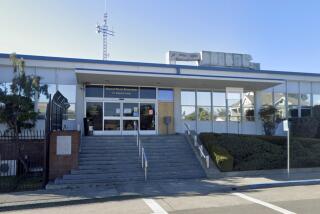Defendants Seek to Bar Past Charges From King Case
- Share via
Lawyers for the four Los Angeles police officers charged with violating Rodney G. King’s civil rights filed motions Monday seeking to prevent the government from introducing evidence that three of the officers were charged with misconduct in other cases.
“They are just completely irrelevant to this case,” said Ira Salzman, lawyer for Sgt. Stacey C. Koon. “It’s clearly inadmissible.”
Officers Laurence M. Powell and Theodore J. Briseno, former officer Timothy E. Wind and Koon are charged with violating King’s civil rights on March 3, 1991, when King was beaten by officers trying to arrest him. To bolster its case that the officers intentionally sought to deprive King of his rights that night, the government has asked to introduce evidence of three separate incidents involving Powell, Briseno and Koon.
Each involves alleged brutality against suspects, and the government maintains that the similarities between the old cases and the new accusations are strong enough that a jury should be allowed to hear about them.
In Koon’s case, prosecutors say that a 1986 incident in which Koon was accused of falsifying a police report shows that the sergeant is willing to conceal the truth about a police beating. Koon served a five-day suspension for that incident.
Prosecutors maintain that Koon also filed a false report after the King beating. “By downplaying critical details and omitting others altogether, defendant Koon crafted a self-serving account that fails completely to convey its seriousness and brutality,” prosecutors said. “That provides strong evidence that Sergeant Koon was aware that the force used against King was excessive and inappropriate.”
Similarly, prosecutors hope to introduce evidence that Powell punched a handcuffed juvenile suspect in 1990 and that Briseno stomped a child-abuse suspect in 1987.
Defense lawyers argued in their motions that those events have no bearing on the current case, and therefore the jury should not be allowed to hear about them.
“This will not aid the jury; it will only prejudice Powell,” lawyer Michael P. Stone wrote.
Harland W. Braun, Briseno’s lawyer, said the prosecutors’ move would “reduce this trial to a carnival with four simultaneous acts under the big top.”
Government lawyers disagree, and indicate in documents that they are not only hoping to introduce the three acts that they have specified, but also are continuing to investigate at least Powell’s personnel records. Prosecutors said they expect that investigation to be finished by the end of the year.
Wind’s lawyer, Paul R. DePasquale, argued that the other alleged incidents of misconduct could be damaging to his client even though prosecutors have not sought to introduce evidence of “other acts” against Wind.
“If evidence is presented that the other three defendant police officers here all have been accused of misconduct, the jury may well conclude that Wind may also have committed, or been accused of, such acts of unnecessary force in his career and has simply not been caught,” DePasquale wrote.
As the pretrial maneuvering mounts, lawyers for the defendants also suggested that tension in Los Angeles remains so high that the federal trial of the four men might have to be postponed until late next year, rather that beginning as scheduled in February.
“We’re going to need to make an assessment of the tension in the community as our trial date approaches,” Salzman said in an interview. “If the tension is as high as it is today, I don’t think these men can get a fair trial.”
Braun has even argued that the case is so well known--as are the riots sparked by the not guilty verdicts for the officers last spring--that the defendants cannot receive a fair trial anywhere in the United States.
There also remains the possibility that the case could be split into two trials, as several of the defendants are arguing that their cases are compromised by being tried together.
That argument is being mounted with particular vigor by Briseno, who broke from the other officers during last spring’s state trial, at which he testified that the beating was “out of control.” Braun and Briseno have even challenged the right of Stone to participate in the case, citing a potential conflict of interest.
In a declaration filed with the court, Briseno has claimed that Stone was “part of a conspiracy to defame and quiet me.”
Stone angrily rejects those allegations, but has joined Braun in requesting a special hearing to consider the charges. “If the majority of allegations are true, counsel for Powell should not only be disqualified, he should be disbarred,” Stone wrote.
Stone will have an unusual ally at that hearing. Prosecutors agree that Stone had no conflict of interest, and they maintain that Briseno has not produced enough evidence to back up the claim that Stone was part of any conspiracy working against Briseno.
On a very small number of issues, the government and defendants are in agreement, most notably on the question of protecting the identity of jurors in the case. Lawyers for both sides say that only anonymous jurors will feel free to impartially consider the charges, and both sides have made suggestions for protecting their names, addresses and occupations.
More to Read
Sign up for Essential California
The most important California stories and recommendations in your inbox every morning.
You may occasionally receive promotional content from the Los Angeles Times.











